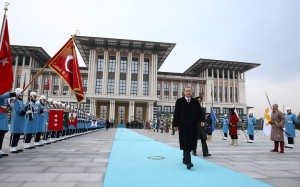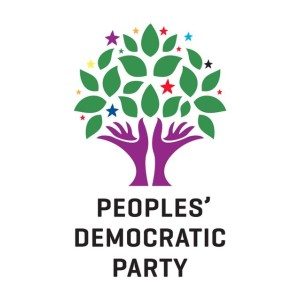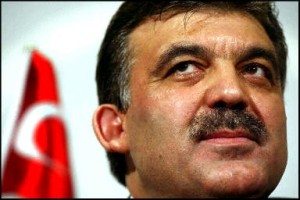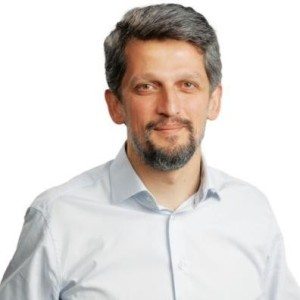Turkish-Armenian Candidates on Ballots
On Sun., June 7 the people of Turkey’s 85 electoral districts will head to the polls to elect the members of their 25th National Grand Assembly of Turkey (Türkiye Büyük Millet Meclisi, TBMM).
‘New Constitution’

Turkish President Recep Tayyip Erdogan at the Presidential Palace (Photo: Official Website of the Turkish President)
At stake is not only who will be elected to the 550-member Turkish Parliament but more importantly the fate of the Turkish constitution. As polling results indicate, the governing Justice and Development Party (Adalet ve Kalkinma Party, or AKP) is poised to win the plurality of votes, giving them the opportunity to introduce the “new constitution” that their leader has publicly expressed on many occasions.
This “new constitution” will change Turkey’s form of government from a parliamentary republic to an executive presidency, in short, centralizing the power of the presidency. This shift will include giving the office the authority to appoint judges to the higher courts and to chair the National Security Council (NSC), just to name a few advantages.
It must be noted that in order to form a government a party must have 276 seats; in order to propose a change in the constitution without a referendum, it must have 367 seats.
In August 2014, then-Prime Minister Recep Tayyip Erdoğan won the first direct presidential elections with 51.8 percent of the popular vote. Before and after the elections, he actively promoted the transformation of the government to a presidential hierarchy. Should his proponents succeed, critics of this plan fear a decline of democratic freedoms currently enjoyed in Turkey.
Undoubtedly, increasing the powers of the presidency will bolster a totalitarian style of rule that many human rights activists believe is already occurring. This method of governing could further paralyze the press, impact individual expressions of free speech, legalize imprisonment for those voicing dissenting views or standing in opposition, and force women to wear head scarfs. Finally, the current law that criminalizes what is deemed “insulting the president” and was the basis for the imprisonment of a 16-year-old boy would be used with extreme prejudice and enthusiasm.
AKP Tactics
Erdoğan has been traveling across the country attending rallies, giving speeches, promoting the new presidential system, and encouraging crowds to vote with the AKP in a campaign to assure the number of seats needed to change the constitution.
His travels are not limited to Turkey. Recently he went to Germany, where there is a large Turkish population that has already begun the voting process. While speaking there he could not resist the opportunity to verbally attack the Alevi community by making such incendiary remarks such as, “in Europe there exists Alevis without Ali,” targeting Turgut Öker, an Alevi candidate on the pro-Kurdish Peoples’ Democratic Party (Halklarin Dmokratick Partisi, HDP) slate, and urging the crowd to give Öker the response he deserves on June 7. Critics of this speech have pointed out that Erdoğan’s tactic of trying to increase his power by triggering a Sunni-Alevi conflict will not work.
Recently, the HDP filed a complaint against Erdoğan, asking the Constitutional Court to stop him from continuing to take part in the election campaign. The court rejected the complaint unanimously, bringing into question the bias and predisposing condition of the court. The current constitution requires the president to remain neutral, and explicitly prohibits him from campaigning in general elections, to prevent giving a huge advantage to the ruling party.
The Absence of Gul and Gulen
Absent from the election process is former President Abdullah Gül, the co-founder of the AKP. He is known to be a moderate with the ability to build consensus and remains very popular in the country. It is clear that he chose not to take part in this election cycle; however, he could not escape Erdoğan’s attention.
Recently, the president made a statement accusing Gül of “giving the Armenians a trump card with the football diplomacy initiative.” Erdoğan seems determined on tying Gül to Armenians.
Gül was also accused of meeting with Fethullah Gulen in 2013, a fact Gül never denied. Gülen, a religious cleric also known as Fethullah Khoja, founded the worldwide Gülen Movement. He was a former partner in politics and friend of Erdoğan and he actively participated in the formation of the government. He is now living in exile in Pennsylvania.
It must be added that also in 2013, current Prime Minister Ahmet Davutoglu visited Gülen, as did other notables.
Gülen, 74, in ill health and with no apparent successor, has been made irrelevant in this election. A warrant for his arrest has been issued by a Turkish court, and extradition back to Turkey has been filed with the United States for his return to Turkey to stand trial. The validity of the charges is in question and the case built against him seems more as a preventative measure than one of criminal justice. Fears of Gülen returning to Turkey, a la Khomeini in Iran, have now been laid to rest.
The 10 Percent Rule
Approximately 20 political parties will participate in this election. A critical, fail-safe mechanism for the party in power, known as the 10 percent rule, will reduce that number to a handfull represented in the parliament. A political party needs to receive a minimum of 10 percent of the votes nationally in order to be allocated a seat in the parliament. All votes received by parties who receive less than 10 percent are given to the winning party in that district—more power to the powerful. This statute is the legal means to benefit the ruling party while suppressing political opposition.
In the past, the CHP Party attempted to challenge the 10 percent, but it did not materialize.
Eligible Voters and Candidate Selection
Unlike the United States, which assigns representatives based on each state’s population, Turkey utilizes the list of “eligible voters.” This method is subjective, can easily be manipulated, and is often used to suppress minority votes. In Van, which is considered an HDP (Kurdish Party) stronghold, the number of elected parliamentarians is based on 600,000 eligible voters. Van’s population is well over 1 million.
In most countries that have democratic elections, the candidates come up through the ranks. The nominee may be elected in a primary or perhaps selected by the local or state party apparatus. In Turkey, a handful from the party’s leadership decides who the candidate will be.
That is why the slate of the AKP candidates resembles a guest list to an Erdoğan family wedding: Berat Albayrak, Erdoğan’s son-in-law; Mücahit Arslan, confidant to the president; Aydin Ünal, Erdoğan’s former speech writer; Ali Ozkaya, Erdoğan’s lawyer; Yalcin Akdogan, deputy prime minister, just to name a few.
As it is in many countries around the world, this election will not be without fraud. A wide range of irregularity is expected—stuffing ballots, destroying ballots, undercount or over count, and all other manners of fraud. This is nothing compared to the attack on the headquarters of the opposition parties and their leaderships’ offices and homes. This occurred in Diyarbakir in May. The home of Selahattin Demirtaş, co-chairperson of the HDP, was raided on May 12. Authorities have stated that police raided his home by mistake.
Bombing and Attacking HDP

The Pro-Kurdish HDP has Armenians on its list of candidates, including Murad Mihçi, Filor Uluk Benli, and Garapet (Garo) Paylan.
Today’s Zaman newspaper reported on May 18 that two separate explosions occurred against the HDP leadership. “An explosion in the city of Adana, where the six were injured, appeared to have come from a package delivered to the office,” an official told Reuters. Footage broadcast by CNN Turk showed windows smashed in a three-story building, and broken glass and debris covering the street. It showed one man sitting on a curb with blood on his head, but it was not clear which city the footage was from.
The paper went on to state, “Another explosion occurred at around the same time in Mersin, where HDP co-chairman Selahattin Demirtaş was scheduled to hold a public rally today for the parliamentary elections slated for June 7. A bunch of flowers left in front of the building where the HDP office is located is suspected to be the source of the explosion. There were no immediate reports of injuries in the second blast.”
Turkish-Armenian Candidates
In an amazing turn of events and 50 years after the last Turkish Armenian was elected, this year Turkish Armenians will appear on the ballot. The last Armenian to have been elected and seated in parliament was Berj Sahag Turan who served from 1961-64 as a senator. This trend is not limited to Armenians; Yazidis, Romas, Syriacs, and Greeks, among other minorities, are also being represented in this election.
Not surprisingly, the Pro-Kurdish HDP has Armenians on its list of candidates, including Murad Mihçi, Filor Uluk Benli, and Garapet (Garo) Paylan. Even the ruling AKP has an Armenian candidate on its list: Markar Esayan, a columnist in the daily Aksam, a pro-AKP paper.
What is surprising, however, is the appearance of an Armenian—Selina Özuzun Doğan—on the Republican People’s Party (CHP) candidate’s list. The CHP’s has a nationalist ideology; it was founded by Kemal Ataturk and sees itself as the protector of realm—the foundation of Turkey.
Today, the CHP is in the middle of an internal battle between right-wing nationalists and left-leaning reformers. It is under these conditions that a female and an Armenian came to be on their slate. It is reported that Chairman Kemal Kılıçdaroğlu himself chose Özuzun Doğan over Goksel Gulbey, someone who leads an organization formed to “fight the Armenian lies” and has made promoting genocide denial his life’s work. This would have been impossible to imagine just a few years ago. Those who oppose Doğan within the party have been very vocal, with some requesting her withdrawal. Her candidacy sparked the Aydinlik newspaper to run a story with the headline, “Özuzun Doğan’s candidacy provided a centennial gift to the Armenian Diaspora.”
Voting Has Begun in U.S.
It is estimated that the number of votes to be cast in the United States is approximately 90,000. Voting began on May 16 and will end on May 31 at 7 p.m. Included in these numbers are Armenian immigrants from (primarily) Bolis (Istanbul), now settled in the communities of Watertown (Mass.), New York, New Jersey, and other states.
For the first time in a decade, there is an opportunity to elect a Turkish-Armenian from Istanbul’s districts I and II. These communities can add their voices to those Armenians in Turkey fighting for a “public” Armenian identity. They are demanding the same civil rights and protection under Turkish law provided to other citizens of that country. Casting their ballots for the HDP candidates is the best way to support these ideals.
The post All Eyes on Turkey: Parliamentary Elections on June 7 appeared first on Armenian Weekly.

